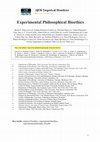Academic Articles by K. Tobia

AJOB Empirical Bioethics, Feb 25, 2020
There is a rich tradition in bioethics of gathering empirical data to inform, supplement, or test... more There is a rich tradition in bioethics of gathering empirical data to inform, supplement, or test the implications of normative ethical analysis. To this end, bioethicists have drawn on diverse methods, including qualitative interviews, focus groups, ethnographic studies, and opinion surveys to advance understanding of key issues in bioethics. In so doing, they have developed strong ties with neighboring disciplines such as anthropology, history, law, and sociology. Collectively, these lines of research have flourished in the broader field of “empirical bioethics” for more than 30 years (Sugarman & Sulmasy 2010). More recently, philosophers from outside the field of bioethics have similarly employed empirical methods—drawn primarily from psychology, the cognitive sciences, economics, and related disciplines—to advance theoretical debates. This approach, which has come to be called experimental philosophy (or x-phi), relies primarily on controlled experiments to interrogate the concepts, intuitions, reasoning, implicit mental processes, and empirical assumptions about the mind that play a role in traditional philosophical arguments (Knobe et al. 2012). Within the moral domain, for example, experimental philosophy has begun to contribute to long-standing debates about the nature of moral judgment and reasoning; the sources of our moral emotions and biases; the qualities of a good person or a good life; and the psychological basis of moral theory itself (Alfano, Loeb, & Plakias 2018). We believe that experimental philosophical bioethics—or “bioxphi”—can similarly contribute to bioethical scholarship and debate. Here, we introduce this emerging discipline, explain how it is distinct from empirical bioethics more broadly construed, and attempt to characterize how it might advance theory and practice in this area.










Uploads
Academic Articles by K. Tobia